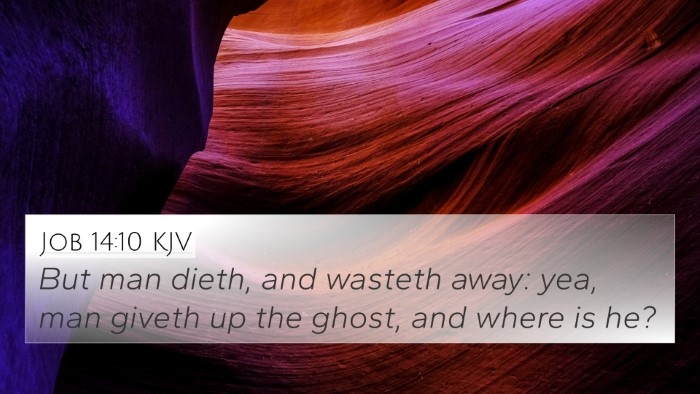Old Testament
Genesis Exodus Leviticus Numbers Deuteronomy Joshua Judges Ruth 1 Samuel 2 Samuel 1 Kings 2 Kings 1 Chronicles 2 Chronicles Ezra Nehemiah Esther Job Psalms Proverbs Ecclesiastes Song of Solomon Isaiah Jeremiah Lamentations Ezekiel Daniel Hosea Joel Amos Obadiah Jonah Micah Nahum Habakkuk Zephaniah Haggai Zechariah MalachiJob 3:13 Similar Verses
Job 3:13 Cross References
For now should I have lain still and been quiet, I should have slept: then had I been at rest,
Uncover the Rich Themes and Topics of This Bible Verse
Listed below are the Bible themes associated with Job 3:13. We invite you to explore each theme to gain deeper insights into the Scriptures.
Job 3:13 Cross Reference Verses
This section features a detailed cross-reference designed to enrich your understanding of the Scriptures. Below, you will find carefully selected verses that echo the themes and teachings related to Job 3:13 KJV. Click on any image to explore detailed analyses of related Bible verses and uncover deeper theological insights.
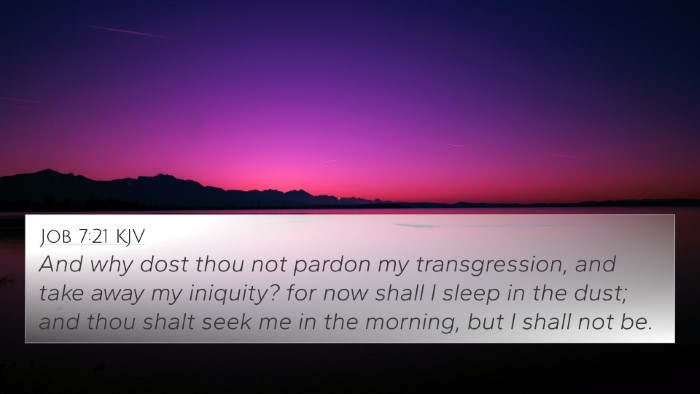
Job 7:21 (KJV) »
And why dost thou not pardon my transgression, and take away my iniquity? for now shall I sleep in the dust; and thou shalt seek me in the morning, but I shall not be.
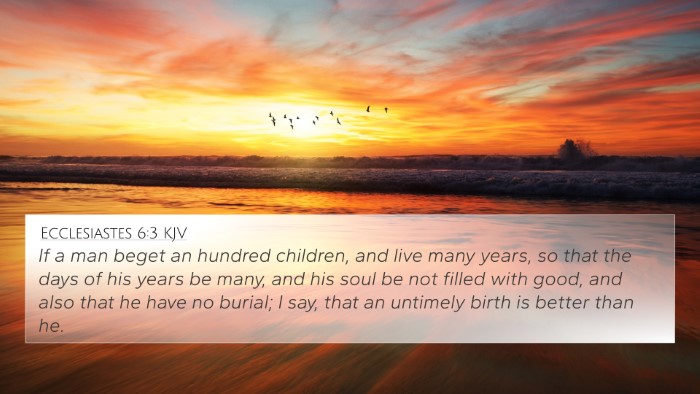
Ecclesiastes 6:3 (KJV) »
If a man beget an hundred children, and live many years, so that the days of his years be many, and his soul be not filled with good, and also that he have no burial; I say, that an untimely birth is better than he.

Job 19:27 (KJV) »
Whom I shall see for myself, and mine eyes shall behold, and not another; though my reins be consumed within me.
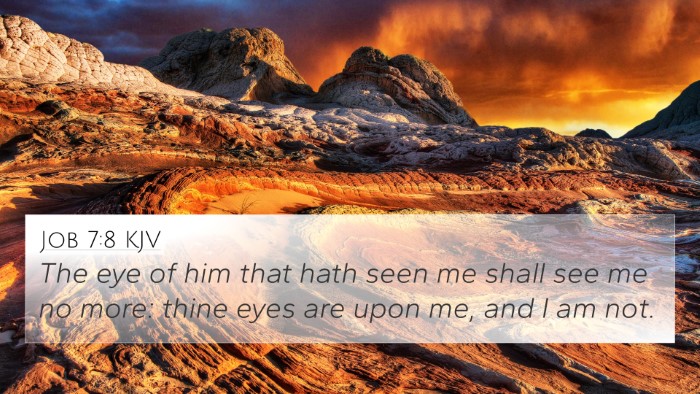
Job 7:8 (KJV) »
The eye of him that hath seen me shall see me no more: thine eyes are upon me, and I am not.
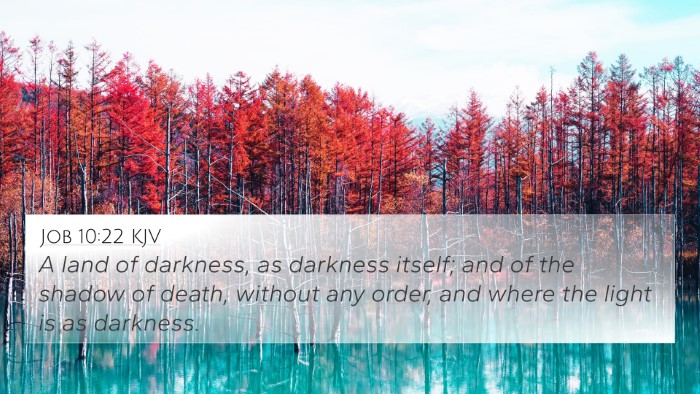
Job 10:22 (KJV) »
A land of darkness, as darkness itself; and of the shadow of death, without any order, and where the light is as darkness.

Ecclesiastes 9:10 (KJV) »
Whatsoever thy hand findeth to do, do it with thy might; for there is no work, nor device, nor knowledge, nor wisdom, in the grave, whither thou goest.
Job 3:13 Verse Analysis and Similar Verses
Understanding Job 3:13
The verse Job 3:13 states: "For now I would have lain still and been quiet, I would have slept; then had I been at rest." This passage occurs within a context of deep lament from Job, who is grappling with extreme suffering and despair after losing his family, health, and wealth. The words convey Job's longing for peace through death, reflecting a profound existential crisis.
Contextual Analysis
This verse is part of a larger soliloquy where Job curses the day of his birth. To understand its significance, we consider the themes of suffering, despair, and the yearning for peace. Job expresses that the pain he endures makes death seem like a sanctuary.
Commentary Insights
-
Matthew Henry:
Henry notes that Job's lament shows profound sorrow and the weight of prolonged suffering. He emphasizes that Job feels he would be better off if he had died at birth, asserting that his pain has rendered life unbearable. Job's reflections underscore the reverberating pain of loss and isolation.
-
Albert Barnes:
Barnes elaborates on the notion that Job yearns for peace in death, which he believes would offer relief from his turmoil. The perspective reflects a common human reaction to suffering, where the thought of rest becomes more appealing than enduring pain. Barnes highlights that Job's sorrows contribute to a deep philosophical questioning of life and death.
-
Adam Clarke:
Clarke mentions that the speaker's desire to sleep hints at a wish to escape from reality. Clarke contextualizes Job's despair within the traditional understanding of suffering in the ancient Near East, where such lament was not uncommon. He offers a theological reflection on the nature of human suffering in conjunction with faith.
Cross-References Related to Job 3:13
To enhance our understanding of Job 3:13, it is beneficial to explore related scripture. Here are some Bible verse cross-references that echo similar themes:
- Psalm 39:13 - "Look away from me, that I may smile again, before I depart and am no more!"
- Ecclesiastes 6:5 - "Moreover, it has not seen the sun or known anything; this has more rest than the other."
- Job 14:14 - "If a man dies, shall he live again? All the days of my service I would wait till my renewal should come."
- Philippians 1:21 - "For to me to live is Christ, and to die is gain."
- Revelation 14:13 - "And I heard a voice from heaven saying, 'Write this: Blessed are the dead who die in the Lord from now on.'"
- Isaiah 57:1 - "The righteous man perishes, and no one lays it to heart; devout men are taken away, while no one understands."
- 2 Corinthians 5:8 - "Yes, we are of good courage, and we would rather be away from the body and at home with the Lord."
Thematic Connections
The verse Job 3:13 invites a discussion regarding broader themes encompassing:
- Despair and Hope: Reflections on suffering often unveil a duality of despair and the potential for hope through faith.
- Life and Death: The contemplation between life and death is pervasive in scripture, linking various human experiences across the Bible.
- The Nature of Suffering: How suffering instigates dialogues of faith, identity, and purpose amongst believers and across scriptures.
Tools for Bible Cross-Referencing
To fully engage with the connections between Bible verses, consider using the following tools:
- Bible concordance for locating specific themes and words.
- Cross-reference Bible study guides to navigate relational scripture.
- Online tools for identifying connections quickly across multiple translations.
- Printed reference materials that provide comprehensive cross-references for in-depth studies.
Interpreting Biblical Themes
When exploring inter-Biblical dialogue, it is vital to analyze how Job's words mirror or contrast with later theological insights. Specifically, consider:
- Finding Cross-References: Develop skills in identifying related verses that inform the understanding of suffering and peace.
- Identifying Old and New Testament Connections: Investigating how themes of despair resonate in Christ’s teachings and the New Testament.
- Comparative Study: Utilize resources to explore parallels and contrasts among different scriptural accounts of suffering.
Conclusion
Job 3:13 serves as a poignant reflection on suffering and the desire for peace. Through comparative Bible verse analysis and scriptural cross-referencing, it becomes clear how deeply woven the themes of life, death, and existence are within the biblical narrative. Engaging with the insights from various commentaries allows for a richer understanding of this verse, and exploring connections with other scriptures deepens our appreciation for the complexities of human experience as depicted in the Bible.





